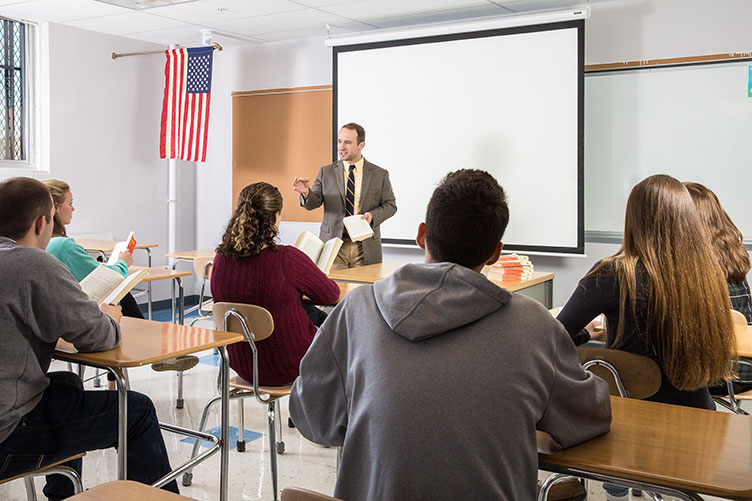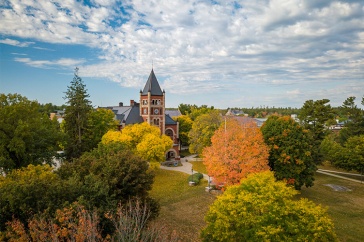
Photo: David Speltz / Camera Commons
Tate Aldrich '08 has a simple life philosophy: Bloom where you're planted. That perspective is among the reasons that, when he was offered a teaching job at Laconia High School, where he had been a student just a few years earlier, he jumped at the opportunity. “I had so many great teachers, coaches and mentors when I was a student in the Laconia school district," he says. "I wanted to give back to my community.”
“My job as a public servant is to recognize what my community requires from me. As a teacher, I wouldn’t be doing my job if I didn’t go beyond the curriculum.”
But there was a learning curve, even for Aldrich, whose roots at the school and in the community ran deep — his father, too, was a Laconia High graduate who returned to teach. When he began teaching English in 2009, Aldrich knew the basics, but he “didn’t know what it meant to serve,” he says. The lessons of the intervening eight years have changed Aldrich as a person and as a teacher, and his successes in and out of the classroom have earned him accolades. In September, the state Department of Education named Aldrich New Hampshire’s 2017 Teacher of the Year.
Aldrich’s revelations about teaching came during a difficult school year. He began to notice how his students’ lives outside of school affected their performance in the classroom. Food insecurity, hunger, poverty, drug addiction — none existed solely outside school hours.
“There was a year’s time when I had ex-students die of heroin overdoses, current students’ parents die of heroin overdoses and former (LHS) classmates of mine die of heroin overdoses,” Aldrich says. “I had to ask myself, why is this happening to people in my community?”
And so Aldrich began to focus on making his teaching a “mutually informative experience,” to learn as much from his students as they learned from him. Their lives are complex, and so is the community they live in, and Aldrich’s eyes were opened to the important connections between the two.
“My job as a public servant is to recognize what my community requires from me,” Aldrich says. “As a teacher, I wouldn’t be doing my job if I didn’t go beyond the curriculum.”
“What we want to achieve is a cultural change. In a city where there’s a drug epidemic, where students suffer poverty … if we’re going to change that culture, it’s going to take time and initiative beyond school walls.”
Aldrich began working with Got Lunch!, a local group that provides food for children in need during the summer, and Stand Up Laconia, a substance misuse advocacy and prevention group. With Got Lunch!, he organized the city’s first school-wide spelling bee, a fundraiser that collected more than 300 non-perishable food items.
His time at UNH helped mold him into the teacher he would become, he says. “My mind and my heart were both shaped by the classes I attended, the people I met, and the experiences I had.”
Former instructor Leah Williams, a senior lecturer in English, isn’t surprised at Aldrich’s success.
“He was such a thoughtful contributor to discussion, and his comments on readings and peers’ stories revealed insight, humor and empathy,” Williams says. “It’s a joy to see him awarded with such a great honor.”
For Aldrich, who became head of Laconia’s English department last year, that honor is also a responsibility. He’ll be traveling in 2017, talking about education and the challenges facing Laconia and other New Hampshire communities. He wants to encourage young people like himself to return to their hometowns and “give back to the communities that gave back to them.”
There’s still plenty of work to be done inside and outside the classroom. Aldrich has plans for more events and fundraisers, including an open mic poetry night — inspired by the open mics he took part in while at UNH.
“What we want to achieve is a cultural change,” he says. “In a city where there’s a drug epidemic, where students suffer poverty … if we’re going to change that culture, it’s going to take time and initiative beyond school walls.”
Originally published in UNH Magazine Winter 2017 Issue
-
Written By:
Larry Clow '12G | UNH Cooperative Extension



















































